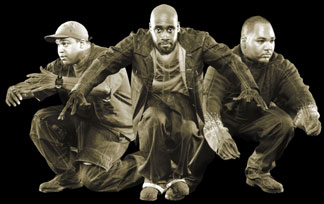It's been some 13 years since De La Soul first leapt out from the suburbs in a hail of hippie imagery, rhyming about potholes, best buds and the BK lounge. They've seen the rise and fall of many of rap's heroes, including nearly all those affiliated with their legendary Native Tongues movement. They have not only lived to tell about it, but can still carry their weight in a time when most dinosaurs are neither respected as a threat, nor even acknowledged as having ever existed.
As the creators of the Spitkicker Tour, now one of the most respected collections of touring MCs in hip hop, De La prove that they can still hang with the young cats. Last year they shared the spotlight with lyrical heavyweights Talib Kweli and Pharaoh Monch, and brought old-timers like Biz Markie in from time to time to let the kids know how it used to be.
Their latest album, AOI:Bionix, was a breath of fresh air for longtime fans, some of whom were worried that the De La show had finally run its course after the crew appeared to be shooting for the big tent with the pop direction of their last album. But with the recent demise of their career-long homestead, Tommy Boy Music, questions once again linger about the future of one of hip hop's few remaining productive elders.
WORD had a chance to talk to De La Soul on a tour stop in Toronto, to get some answers about their label situation, and to get some idea of what it means to still be in the majors after nearly a decade and a half.
WORD: It's been less than a year since the album dropped. Are you guys happy with the response that it got?
Dave: The album didn't really get a response. People don't really know that the record is out because of the demise of the label, and no money really being put into the promoting of the record or nothing like that. So the masses really don't know the record is out. A lot of the fans know, but there was really no hype, no information. So, it's cool to know that that's the reason why the record ain't jumpin', but it's kind of unfortunate what happened to Tommy Boy, such a landmark in hip hop. A lot of great groups came out of it, and it's just unfortunate how it went down for Tommy Boy, and for us to not really find out how it was going to happen. But we move on, and we're just trying to make things happen.
WORD: So what's the situation with the label now then, and with you guys?
Dave: Well, from Tommy Boy we were part of the WEA system [Warner Brothers, Elektra and Atlantic], and they kinda pulled us and were deciding where we would go, and we landed on Elektra for a while. But that kinda fizzled out and we were on the label for about a month, but we were still in the system and just trying to figure out where we were gonna go, Warner or Atlantic. We just sat amongst ourselves and were like, "Let's just ask for a release and just be let go."
WORD: You had that option?
Dave: Ya, and we got it. So we are no longer part of the WEA system, Warner Brothers, Tommy Boy or anyone. We're like free agents, just chillin' for a while, doing a little recording, a little touring, and we'll figure it out later on.
WORD: I guess that will affect the final installment of the AOI trilogy.
Dave: It really doesn't, because we aren't committed to anyone to do it anyway, and none of the labels own the right to do an album that hasn't even been done yet. So we're thinking about just doing it ourselves, putting it out later this year. As we said from the beginning, it's gonna be a DJ record, with more instrumentation, as opposed to singing and stuff, and we'll just try to put the record out, promote the best we can and just see what we can do with it.
WORD: As far as making Bionix, were you more comfortable after already putting one down?
Dave: Ya, it was kinda cool. The pressure was on with Mosaic Thump because we had just come off a great record, Stakes Is High, and at that point it kinda re-established our position in the game and letting our fans down, and even the new eyes that were on De La, was not what we were trying to do. But the album turned out well. The Bionix album was just fun, man, it was just "let's just go in the studio and do some songs and just get a vibe off of it." It wasn't any pressure at all, and luckily we didn't even know about what was happening with Tommy Boy, because I think that might have put a little bit more pressure on us. But we just went in and did a great record.
WORD: I noticed that, lyrically, you guys really tried to step it up. On songs like "Trying People" and "Special," you guys touch on the impact on your relationships, on your families. How does being a full time artist impact that?
Dave: It's difficult, man. You know, Mase is married with four children, and it's kinda tough not being home, not seeing first steps, first riding the bike, basketball games and all of that. Even at home, I have a 13-year-old daughter, and not being able to be around sometimes. I'm also engaged, and not being able to be there for my fiance at times, you know, when they wanna talk and just see your face. It's tough, but you know that this is just about putting food on the table and just making a living and making it work for your family, but at the same time it also gets stressful. You wanna be home sometimes.
WORD: As far as doing this, you guys have been making music and putting out hip hop for about a decade and a half now. What has allowed you to do this for so long and to still put out creative and relevant material?
Dave: I think that naturally we're just creative people. We aren't just guys who write rhymes, there's always been an aura about ourselves, an attribute that we have where each individual is artistic in a way, whether it's drawing concepts, lyrics, music or what have you. I think we all have that inside us, and when you put the three together it just works. You know, wanting to be able to do it is another thing too, we're hungry for creating, we appreciate putting this together and trying out new sounds, trying different ideas and trying to do what everyone else isn't. I think that's just a challenge for us. And then it's the love for each other. I couldn't think of doing it with no two other people, and I think that Pos would feel the same and Mase would feel the same.
WORD: What are some of the big differences you've noticed in hip hop from when you guys first started out?
Dave: Definitely hip hop has grown. You know, when we started off we went to Europe, and places like Amsterdam and Japan and London, and hip hop was still young then. They were still trying to do their version of it but to an extent, mimicking what the States was doing. But now you see hip hop in every country, and they're claiming their own style. It's a great thing that hip hop has gone everywhere across the board, and it has ended up being big business now and that's beautiful. It has given the opportunity for a lot of young people to get into this game and make a living and become entrepreneurs. But at the same time, with all that being good and everybody making money, and everybody catching a vibe and being in the scene, it kinda kills the artistic sense of hip hop and, also, how special it was. I think a lot of artists out there are chasing the dollar. They come into this game making dollars, so there's really no stage of earning it, or knowing the tough times and struggling, and trying to make your own identity and become somebody.
WORD: With the music that you make, you guys have always tried to keep it positive. But there's a lot of music that just constantly emphasizes the negative in life. Do you think things are really that bad...
Dave: I think a percentage of it is what people are going through and what people have experienced. But we are all adults of sound mind, and I think it gets to a point where we gotta say 'you know, I hate talking about the ghetto, I hate talking about how rough it is, I hate talking about how much I had to rob and steal.' It's like, you're only perpetuating that when you constantly talk about it. Slick Rick said on The Show soundtrack that we've all been in the ghetto, we've all been in the hood, we've all been through hard times, but we've been through that. Think of it as we've been through that, let's make it better, let's talk about better situations, and about empowering ourselves and learning from our mistakes and doing better. And I think it's kinda lame to say "well you know, it's what I been through, it's my life, it's what I'm going through." I mean, you smile once in a while, man, you hug your moms, you love your kids, and you do a whole lot more than hustling drugs and supposedly smacking bitches. We're smarter than that, so I can't justify people's lyrics and what everybody thinks is cool nowadays, just because they lived it.








